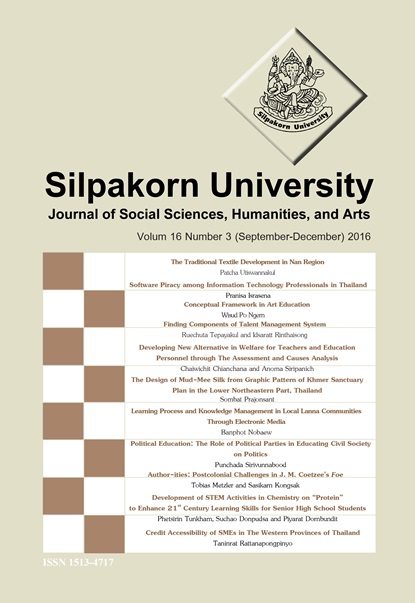Political Education: The Role of Political Parties in Educating Civil Society on Politics
Main Article Content
Abstract
This study uses extensive field research to compare and contrast the political education that political parties provide for their members and people. The researcher focuses on two political parties: the Democrat Party and the Puea Fah Din Party based on four important reasons: 1) both parties have constantly played significant roles in Thai politics for a long period of time; 2) both parties have apparent organization and internal structure; 3) both parties have the accurate number of party members as well as party branches in the past years; and 4) both parties have organized more or less political education for their party members and the public. The research result reveals that due to the differences in the objectives of party formation, political ideology, political participation and the strategy to recruit members, the two parties experience distinctive procedures to conduct political education for their members and public in general. While the Puea Fah Din Party was founded and has been working with the Asoke Community as a means to represent Asoke in politics rather than winning the elections, the Democrat Party was founded by political elites and aims to win the elections. As a result, the Puea Fah Din Party conduct activities on political education in order to strengthen party’s ideology among members. The Democrat Party, on the other hand, organize political activities to education people in general about party’s policy with a hope to win the elections.
Downloads
Article Details
All rights reserved. Apart from citations for the purposes of research, private study, or criticism and review,no part of this publication may be reproduced, stored or transmitted in any other form without prior written permission by the publisher.
References
Boaduo, N. (2013) Introduction of Political Education for the Propagation of Democracy in Africa: The Perspective of an African Academic. [Online URL: https://www.jpanafrican.com/docs/vol6no6/6.6-Nana.pdf] accessed on August 15, 2015.
Charney, C. (2003) Voter and Civic Education Needs for the 2003 Cambodian National Assembly Elections. [Online URL: https://www.charneyresearch.com/IDIReport-TAF.pdf] accessed on August 20, 2015.
Harris, P. B. (1979) Foundations of Political Science. London: Hutchinson and Co.
Hofmeister, W. and Grabow, K. (2011) Political Parties: Functions and Organisation in democratic Societies. Singapore: Konrad Adenauer Stiftung.
Hongkrailet, P. (1981) Political Parties and Problems in Thai Political Parties (พรรคการเมืองและปัญหาพรรคการเมืองไทย). Bangkok: Thai Watthanaphanit.
International Institute for Democracy and Electoral Assistance. (2006) The Concepts of Civic Education, Electoral Education and Voter Awareness. [Online URL: https://www.idea.int/europe_cis/armenia/workshop_ci viced.cfm] accessed on August 15, 2015.
Johnston, M. (1949) Political Finance Policy, Parties, and Democratic Development. National Democratic Institute for International Affairs. [Online URL: https://www.ndi.org/files/1949_polpart_johnston_110105.pdf ] accessed on August 31, 2015.
Konrad Adenauer School for Young Politicians. (n.d.) Political Education. [Online URL: from https://www.kasyp.net/ index.php?id=26]accessed on August 21, 2015.
National Democratic Institute. (2008) Institute Minimum Standards for the Democratic Functioning of Political Parties. [Online URL:https://www.ndi.org/files/2337_ partynorms_engpdf_07082008.pdf] accessed on August 22, 2015.
Olaniyi, J. O. (2001) Parties and Political Education in Nigeria: An Overview. [Online URL: https://www.unilorin.edu.ng/journals/education/ije/dec1993/PARTIES%20AND %20POLITICAL %20EDUCATION%20IN.pdf] accessed on August 25, 2015.
Prewitt, K. (1971) Education and Political Values: An East African Case Study.
Nairobi: East African Pub. House.
Rose, R. (1976) The Problems of Party Government. London: Pelican.
Simon, J. (2003) The Change of Function of Political Parties at the Turn of Millennium.
Institute for Political Science of the Hungarian Academy of Sciences. [Online URL: https://www.icps.cat/archivos/workingpapers/wp221pdf ?noga=1] accessed on August 15, 2015.
Thornton, L. L. (2001) Political Party Strategies to Combat Corruption: Executive Summary. The National Democratic Institute for International Affairs (NDI) and
the Council of Asian Liberals and Democrats (CALD). [Online URL: https://www.ndi.org/files/ 1330_polpart_ corruption.pdf ] accessed on August 15, 2015.
Westheimer, J. and Kahne, J. (2004) Educating the “Good” Citizen: Political Choices and Pedagogical Goals. [Online URL: https://www.mills.edu/academics/faculty/educ/jkahne/ps_educating_the_good_citizen.pdf] accessed on August 17, 2015.


